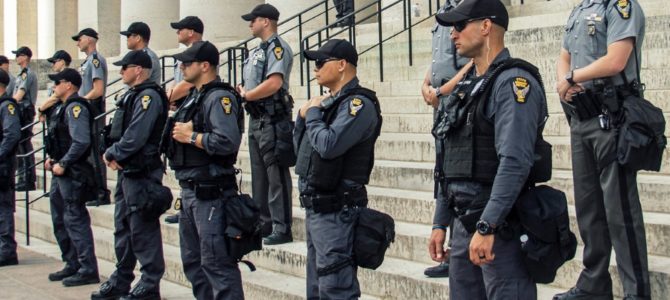No one wants to watch an innocent man suffocate under the knee of a cop while bystanders plead for his life. Yet millions now have that haunting image seared into their memory.
The question to ask in response is simple: what could have been done to prevent this? While I’m in quarantine and can’t see my students, I imagine their predominantly minority faces and wonder how can I keep them from a similar fate?
Policy recommendations to prevent another tragedy like the one that befell George Floyd have ranged from defunding the police to ending qualified immunity and military surplus transfers to departments. But if peaceful protests—of which there have been many—are to achieve any meaningful change, they need a goal.
In the particular case of George Floyd, there is an obvious answer: at least two cops should have lost their jobs long before the event even occurred. George Chauvin, the officer who knelt on Floyd’s neck for more than eight minutes, had previously received 20 complaints filed against him, resulting in two letters of reprimand. His partner, Tou Thao, was sued in 2017 for stopping a man without cause and beating him in the street. In both cases, their contracts protected them.
Unfortunately, this is more common than not. Even after the most egregious conduct, many cops keep their jobs. As previously reported in The Atlantic, there is a long history of precincts still employing cops that would have been fired were it not for police unions keeping them on the force. One off-duty cop pulled his gun on a supposed criminal while intoxicated, misfired, killed the man who was later deemed innocent, and then returned to work.
There are numerous stories of on-duty boozing, theft, and abuse. In each case, the police union fought to reinstate these officers despite their inappropriate conduct.
Unfortunately, our priors often blind us when it comes to any talk of reforming police unions. On the left, any contention against unions is untenable. An author for Slate acknowledged the tension between social justice and police unions but couldn’t bring herself to renounce support for any organized labor. On the right, there’s a strong wariness against being perceived as anti-cop or weak on crime.
In reality, reforming police unions should be a bipartisan issue. The right has a history of undercutting the power of public-sector unions and, in this case, doing so would help promote a greater degree of racial justice in our country. In response to the critics, a weakening of their powers need not imply a complete abolition of unions. Studies blame collective bargaining and other roadblocks to thoroughly investigating cops, not the existence of unions per se.
Yet as with all unions, so too do police unions protect mediocrity, if not incompetence, in a profession trusted with upholding law, order, justice, and safety.
Studies confirm this position. Rob Gillezeau, professor at the University of Victoria, posted about his upcoming research into police violence and unionization. His team found that collective bargaining leads to “a substantial increase in police killings of civilians.” The protections that their contracts allowed shifted the incentives such that, when there was a swift decision to shoot or not, those protections pushed the decision to fire.
Furthermore, Gillezeau’s research found that “collective bargaining rights are being used to protect the ability of officers to discriminate in the disproportionate use of force against the non-white population.” Similar studies conducted by Oxford University as well as the University of Chicago Law School came to the same conclusion: strong unions, and in particular collective bargaining rights, lead directly to an increase in the use of excessive force.
A related negative effect of unions is their tendency to retard or stifle any meaningful reform. After the Ferguson riots in 2014, body-cameras on police officers developed bipartisan support. Then, a union in Miami blocked the initiative.
When my governor Scott Walker sought to limit bargaining rights, police unions got an exemption. Aggressive union contention blocks any structural reform that isn’t merely an increase in funding. But funding is easy. Real, structural reform requires accountability and work.
What could this mean for other proposed reforms? Perhaps ending qualified immunity or the demilitarization of the police isn’t the answer. But if unions are left in such positions of control, such proposals won’t even get discussed.
I’m sympathetic to the crusades against racial profiling and excessive force. But, like many, I’ve spent too much time these past few days watching videos of rioters looting businesses and burning down police stations. Wanton hooliganism will not result in the change we need in America’s police forces.
A man died because a union protected two bad cops. For the sake of the innocent and for the cause of protecting all the good cops out there, the time to reform police unions is now.









